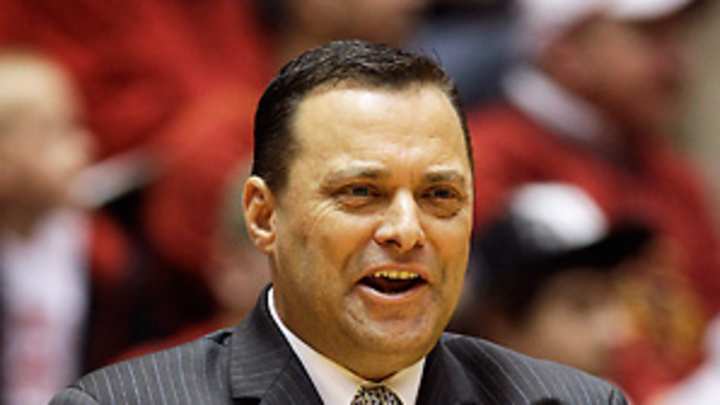Gillispie's hard-nosed reputation built him before destroying him


The Christmas tree in March. That's the image that sticks with me from my visit to Texas A&M in the winter of 2007. There were plenty of stories about Aggies coach Billy Clyde Gillispie and his overkill, tunnel-vision approach to preparing for a basketball game?he told many of them on himself. But the story about the TV crew who had come to film a Selection Sunday segment at his house in El Paso in 2004 and found the forgotten tree, which a friend had installed in December, was, while funny, also kind of sad. Gillispie knew his world, wholly occupied as it was by basketball?the then 47-year-old had no wife, kids or pets?was seriously out of whack. He even laughed when trying to decide if the best term to describe himself was "unbalanced," "imbalanced" or "out-of-balance."
And now Gillispie doesn't even have basketball. Three weeks after allegations about mistreatment of players and rules violations at his latest stop, Texas Tech, first surfaced, Gillispie, who has been hospitalized for high blood pressure and stress, resigned his head coaching position, citing health concerns.
Five years ago, nobody I talked to for a story in SI saw the neglected tree, or the daily convenience-store breakfasts of peanut butter crackers and Dr. Pepper, or the game-day practices, or Gillispie's habit of making managers run if they didn't wipe up sweat fast enough, as anything potentially troubling. The Aggies were winning, and A&M was a program on the rise. Players like senior guard Acie Law IV, who had wanted to quit during his first season with Gillispie because the coach rode him so hard, had come to love how demanding his coach was. He loved the fact that Aggies basketball, long an afterthought on the football-addled campus, was now so in demand that the school had had to institute a lottery for student tickets. The players, said Law, had morphed from nobody special on campus to "rock stars."
Walk-ons?Gillispie usually carried an unheard-of seven?were fighting to be on the team. One walkon, Josh Johnston, had followed Gillispie from El Paso to College Station, such devotion did he feel to his coach. "Between the lines Coach never lets up," Johnston told me. "But off the court he would do anything for you. We're his family."
In my conversation with Gillispie, held in his office among stacks of game tapes?he typically watched 15 of every opponent?the coach was funny, charming and self-deprecating, a small-town Texas boy who considered himself the luckiest guy on earth. He deflected most of the credit for his success to his many coaching mentors, including Kansas coach Bill Self, his former boss at Tulsa and Illinois and the man he still called Coach. "Everything we do here is Coach's idea," he told me.
Yes, Gillispie demanded a lot of his players and managers, and of himself. But his methods produced results. Three years earlier, he had orchestrated one of the most dramatic turnarounds in NCAA history at UTEP. (In Gillispie's second season in El Paso, the Miners had improved from 6-24 to 24-8.) In College Station, he had taken a team that had gone in 0-16 in conference play in 2004 to the seventh-ranked team in the country in 2007. As the Aggies scrapped their way to their Sweet 16 berth since 1980, Gillispie became a hot commodity. Kentucky snapped him up after the season.
At the time, he seemed like a good fit: Gillispie loved horses, he understood hoops obsessiveness, and he had, according to Texas A&M assistant Alvin Brooks, "a great way with people." And he had proved he could win with overlooked players. Imagine what he could do with kind Kentucky could attract?
I didn't talk to Gillispie much after his arrival in Lexington. I don't know what happened there. Perhaps in the face of demands to be a public figure in the state, Gillispie somehow let his impossibly narrow focus on basketball get even narrower. The reports of his treatment of players, fans, and reporters there?he has been characterized as "abrasive" "rude" and "joyless", among other things, while in Lexington?described a different guy than the one I had heard about and observed, admittedly briefly, in Texas. That "great way with people" seemed to have vanished. In his second year, in 2009, he lost 14 games and missed the NCAA tournament. Kentucky fired him after the season.
After two years out of the game, Gillispie got another chance to coach, at Texas Tech. His one season in Lubbock was apparently far uglier than the 8-23 record indicates.
As Jeff Goodman of CBSSports.com reported earlier this month, 30 people have left the program since Gillispie arrived, including 15 players. Goodman reported that Gillispie had kept players in scholarship limbo, reneged on promised jobs, forced injured players to practice, and regularly violated the 20-hour-a week practice rule. In late August a group of players voiced their concerns in a meeting with athletic director Kirby Hocutt,, and the school launched an investigation.
Gillispie's resignation Thursday saved Texas Tech the trouble of firing him.
It is a sad and baffling ending to what had all the earmarks of a great college basketball success story just five years ago. I wish Gillispie the best in restoring his health, and somewhere, somehow, finding balance.
